1061 scholarly books by Catholic University of America Press and 39
have author last names that start with F
1061 scholarly books by Catholic University of America Press and 39
1061 scholarly books by Catholic University of America Press
39 have author last names that start with F have author last names that start with F
39 have author last names that start with F have author last names that start with F
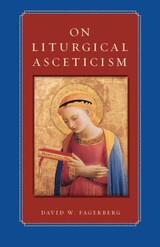
On Liturgical Asceticism
David W. Fagerberg
Catholic University of America Press, 2013
Drawing on the Eastern Orthodox tradition of asceticism and integrating it with recent Western thought on liturgy, David W. Fagerberg examines the interaction between the two and presents a powerful argument that asceticism is necessary for understanding liturgy as the foundation of theology
[more]
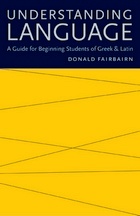
Understanding Language
A Guide for Beginning Students of Greek and Latin
Donald Fairbairn
Catholic University of America Press, 2011
Understanding Language includes major sections on the noun and verb systems of the classical languages.
[more]
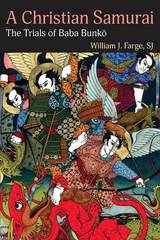
A Christian Samurai
William J. Farge
Catholic University of America Press, 2016
Through a close critical analysis of Baba Bunko's often humorous, but always biting, satirical essays a new picture of the hidden world of Christianity in eighteenth-century Japan emerges - a picture that contradicts the generally-held belief among Western historians that the Catholic mission in Japan ended in failure. A Christian Samurai will surprise many readers when they discover that Christian moral teachings not only survived the long period of persecution but influenced Japanese society throughout the Tokugawa period.
[more]
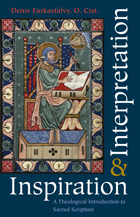
Inspiration and Interpretation
A Theological Introduction to Sacred Scripture
Denis Farkasfalvy
Catholic University of America Press, 2010
Inspiration and Interpretation provides readers with a much needed general theological introduction to the study of Sacred Scripture.
[more]
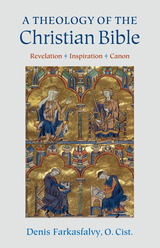
A Theology of the Christian Bible
Revelation - Inspiration - Canon
Denis Farkasfalvy
Catholic University of America Press, 2018
A Theology of the Christian Bible is built upon the thesis that divine revelation, the inspiration and canonization of Scripture should be viewed as “sequentially linked movements” of a single process wherein God reveals his Word in history and ensures permanent accessibility of revelation for his People, both of Israel and of the Church. The starting point is the view expressed in the Second Vatican Council’s document Dei Verbum that revelation consists of the “words and realities” of Salvation History. This marks a shift away from the neo-scholastic concept that approached revelation primarily as a set of propositional truths. Farkasfalvy begins with the notion of revelation as a historical process: God reveals his Word in a “salvation history,” which culminates in the Incarnation. The transmission of revelation always involves human mediation by chosen individuals or, in the language of the biblical and patristic tradition, “Prophets and Apostles.” Farkasfalvy then moves on to review some of the major contributors to the theology of inspiration around the time of Vatican II (Bea, Rahner, Alonso-Schökel), the teaching of Dei Verbum proper, and finally the 2014 document of the Pontifical Biblical Commission and biblical inspiration and the truth of the Bible, treating each of these in its individual context. According to Farkasfalvy, the theology of inspiration was greatly handicapped by the neo-scholastic notion of God as a “literary author” of the scriptural texts. Advocating God as true and genuine “author” of Scripture, but in a non-literary sense, Farkasfalvy also reviews afresh the tradition inspiration-incarnation analogy. Scripture should be thought of in light of God progressively revealing himself in limited and located contexts to chosen human beings, through whom revelation is transmitted in verbal and, eventually, written form. God guides the complex compositional processes of the biblical books so that his word becomes accessibly and permanently preserved in writing for his people, the Church. The final chapters of A Theology of the Christian Bible take up the extension of these dynamics into canonization. These largely exegetical and historical chapters focus on the transmission of the revelation in Christ through both Testaments by means of Jesus’ Apostles, embracing the Hebrew Scriptures and setting in motion the formation and, in early patristics, the canonization of the New Testament.
[more]
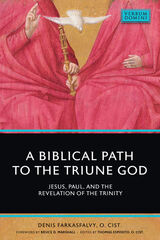
A Biblical Path to the Triune God
Jesus, Paul and the Revelation of the Trinity
Denis Farkasfalvy
Catholic University of America Press, 2021
This short volume, finished just before Denis Farkasfalvy’s death in 2020, serves effectively as his last theological testament. Throughout his scholarly career, Farkasfalvy aimed to reconcile and unite theological disciplines that had increasingly become isolated from each other, most notably the biblical, patristic, and systematic. In A Biblical Path to the Triune God, the Cistercian abbot identifies the earliest biblical witnesses to the Church’s teaching about God, formulated at the Council of Nicaea, as Father, Son, and Holy Spirit.
Jesus’ famous praise of the Father, found almost word-for-word in Matthew 11:25-27 and Luke 10:21-22, is Farkasfalvy’s point of departure for his bold assertion that in the earliest sources, we find abundant evidence that “it was not Jesus who revealed his own divine sonship; rather, the Father revealed it to those whom Jesus had chosen and were open to respond in faith.” Farkasfalvy demonstrates that Jesus reveals his relationship to the Father in terms of intimate and experiential knowledge, transforming the procreative metaphor of filiation from the physical (as in the Psalms and 2 Samuel 7) to the epistemological realm of knowledge, what he calls “love within cognitive dimensions.” Just decades after Jesus’ ministry, numerous independent apostolic witnesses, from the Synoptic Gospels and John to Paul (especially Romans 1:1-4 and Galatians 1:15-16), indicate a robust and widespread understanding of the Father’s self-disclosure in Jesus the Son.
Farkasfalvy concludes his brief but intense reflection by outlining how a single organic process of revelation binds together the Father and the Son, and then extends that loving communion to believers in the Spirit, a communion made possible only by the incarnate Son’s crucifixion and subsequent glorification. This book accomplishes the admirable feat of showing that far from being the invention of later centuries, the Trinitarian doctrine of the Church is firmly rooted in the very first reflections on Jesus’ ministry and mystery by the biblical authors.
[more]
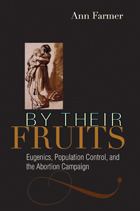
By Their Fruits
Eugenics, Population Control, and the Abortion Campaign
Ann FARMER
Catholic University of America Press, 2008
Though controversial in subject, By Their Fruits presents an important examination of not only the history of abortion legislation but also the history and impact of the Eugenics movement.
[more]
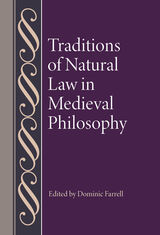
Traditions of Natural Law in Medieval Philosophy
Dominic Farrell
Catholic University of America Press, 2022
Reflection on natural law reaches a highpoint during the Middle Ages. Not only do Christian thinkers work out the first systematic accounts of natural law and articulate the framework for subsequent reflection, the Jewish and Islamic traditions also develop their own canonical statements on the moral authority of reason vis-à-vis divine law. In the view of some, they thereby articulate their own theories of natural law.
These various traditions of medieval reflection on natural law, and their interrelation, merit further study, particularly since they touch upon many current philosophical concerns. They grapple with the problem of ethical and religious pluralism. They consider whether universally valid standards of action and social life are accessible to those who rely on reason rather than divine law. In so doing, they develop sophisticated accounts of many central issues in metaethics, action theory, jurisprudence, and the philosophy of religion. However, do they reach a consensus about natural law, or do they end up defending incommensurable ethical frameworks? Do they confirm the value of arguments based on natural law or do they cast doubt on it?
This collection brings together contributions from various expert scholars to explore these issues and the pluralism that exists within medieval reflection on natural law. It is the first one to study the relation between the natural law theories of these various traditions of medieval philosophy: Jewish, Islamic, Byzantine, and Latin.
Each of the first four essays surveys the ‘natural law theory’ of one of the religious traditions of medieval philosophy—Jewish, Islamic, Byzantine, and Latin—and its relation to the others. The next four essays explore some of the alternative accounts of natural law that arise within the Latin tradition. They range over St. Bonaventure, Peter of Tarentaise, Matthew of Aquasparta, John Duns Scotus, and Marsilius of Padua.
These various traditions of medieval reflection on natural law, and their interrelation, merit further study, particularly since they touch upon many current philosophical concerns. They grapple with the problem of ethical and religious pluralism. They consider whether universally valid standards of action and social life are accessible to those who rely on reason rather than divine law. In so doing, they develop sophisticated accounts of many central issues in metaethics, action theory, jurisprudence, and the philosophy of religion. However, do they reach a consensus about natural law, or do they end up defending incommensurable ethical frameworks? Do they confirm the value of arguments based on natural law or do they cast doubt on it?
This collection brings together contributions from various expert scholars to explore these issues and the pluralism that exists within medieval reflection on natural law. It is the first one to study the relation between the natural law theories of these various traditions of medieval philosophy: Jewish, Islamic, Byzantine, and Latin.
Each of the first four essays surveys the ‘natural law theory’ of one of the religious traditions of medieval philosophy—Jewish, Islamic, Byzantine, and Latin—and its relation to the others. The next four essays explore some of the alternative accounts of natural law that arise within the Latin tradition. They range over St. Bonaventure, Peter of Tarentaise, Matthew of Aquasparta, John Duns Scotus, and Marsilius of Padua.
[more]
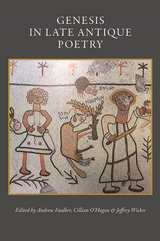
Genesis in Late Antique Poetry
Andrew Faulkner
Catholic University of America Press, 2022
The biblical book of Genesis stands nearly without parallel in the shared history of Judaism, Christianity, and Islam. Because of its abiding importance to late antique theology and practical life across religious boundaries, it gave rise to a wide range of literary responses. The essays in this book study an array of Jewish and Christian responses to Genesis as they took shape in specific literary forms—the unique genres of late antique poetry. While late antique and early medieval Jews and Christians did not always agree in their interpretations of Genesis, they participated broadly in a shared culture of poetic production. Some of these poetic genres paralleled one another simply as distinct examples of metered speech, while others emerged in conversation and through mutual influence. Though late antique poems developed in a variety of languages and across religious boundaries, scholarly study of late antique poetry has tended to isolate the phenomenon according to language. As a corrective to this linguistic isolation, this book initiates a comparative conversation around the Jewish and Christian poetry that emerged in late antique Aramaic, Greek, Hebrew, Latin, and Syriac. Tending equally to exegetical content and literary form, the essays in this book sit at the intersection of a variety of scholarly conversations—around the history of biblical exegesis, the formation of late antique and early medieval literature and literary culture, and the comparative study of Judaism and Christianity.
[more]
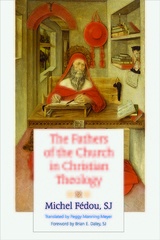
The Fathers of the Church in Christian Theology
Fedou
Catholic University of America Press, 2019
The main purpose of The Fathers of the Church in Christian Theology is to argue that Patristic studies still has much to contribute to theological reflections in our time. Throughout history, the reading of the Fathers of the Church has made major contributions to Christian thinking. This fecundity was notably verified in the 20th century through the work of theologians like Henri de Lubac and Hans Urs von Balthasar. It was as well manifested broadly in the life of the church that, with the Vatican II council, drew from the patristic tradition a source of inspiration for its own renewal.
However, even though the research and work on early Christianity has experienced considerable growth for several decades, Christian theology is today confronted with new questions. Thus, what status to recognize in the exegesis of the Fathers? Has not the distance from the heritage of patristic thinking been widened? More radically, do not the demands of contextual theologies on diverse continents compel a distancing away from some traditions that formerly were principally limited to Mediterranean and European regions?
If these questions must be taken into account, they, nevertheless, cannot dispense with Christian theology being, today as yesterday, inspired and made fecund by the writings of the Fathers. Michel Fédou attempts to shed light on what, in our own era, justifies the necessity of a patristic theology. He shows how the reading of the Fathers contributes to the understanding of the faith in the different fields of Christian thinking. It highlights the importance of their writings for the spiritual life and the valuable nourishment that they thus offer to our times.
[more]
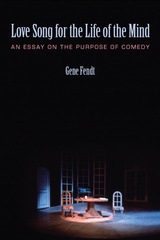
Love Song for the Life of the Mind
An Essay on the Purpose of Comedy
Gene Fendt
Catholic University of America Press, 2007
Love Song for the Life of the Mind develops the view of comedy that, the author argues, would have been set out in Aristotle's missing second book of Poetics. As such it is both a philosophical and a historical argument about Aristotle; and the theory of comedy it elucidates is meant to be trans-historically and trans-culturally accurate.
[more]
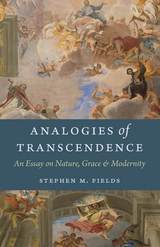
Analogies of Transcendence
Stephen M. Fields
Catholic University of America Press, 2016
The problem of nature and grace lies at the heart of Christian theology. No dimension of divine revelation can be addressed without implicitly drawing reference to this issue.Analogies of Transcendence focuses on the central role that the analogies of being and faith play in developing a solution to the problem. These link God, as self-manifesting transcendence, to the human person as both fallen and justified, and to the material cosmos. Although the proposed solution draws on the work of Maréchal, de Lubac, Balthasar, and Rahner, it criticizes their approach for its underdeveloped analogies that diminish nature in grace's engagement with it. In redressing this weakness, Fr. Fields adapts its solution to the intellectual struggle of our time. This volume examines the origins and structure of modernity, which, it asserts, has not been superseded and is therefore critical of'postmodernism,' as well as of some ambiguous legacies of Thomism.
[more]
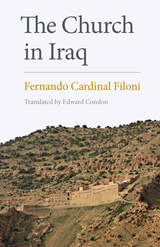
The Church in Iraq
Fernando Cardinal Filoni
Catholic University of America Press, 2017
The persecution of the church in Iraq is one of the great tragedies of the twenty-first century. In this short, yet sweeping account, Cardinal Filoni, the former Papal Nuncio to Iraq, shows us the people and the faith in the land of Abraham and Babylon, a region that has been home to Persians, Parthians, Byzantines, Mongols, Ottomans, and more. This is the compelling and rich history of the Christian communities in a land that was once the frontier between Rome and Persia, for centuries the crossroads of East and West for armies of invaders and merchants, and the cradle of all human civilization. Its unique cultural legacy has, in the past few years, been all but obliterated.
The Church in Iraq is both a diligent record and loving testimonial to a community that is struggling desperately to exist. Filoni guides the reader through almost two thousand years of history, telling the story of a people who trace their faith back to the Apostle Thomas. The diversity of peoples and churches is brought deftly into focus through the lens of their interactions with the papacy, but The Church in Iraq does not shy away from discussing the local political, ethnic, and theological tensions that have resulted in centuries of communion and schism. Never losing his focus on the people to whom this book is so clearly dedicated, Cardinal Filoni has produced a personal and engaging history of the relationship between Rome and the Eastern Churches. This book has much to teach its reader about the church in the near East. Perhaps its most brutal lesson is the ease with which such a depth of history and culture can be wiped away in a few short decades.
The Church in Iraq is both a diligent record and loving testimonial to a community that is struggling desperately to exist. Filoni guides the reader through almost two thousand years of history, telling the story of a people who trace their faith back to the Apostle Thomas. The diversity of peoples and churches is brought deftly into focus through the lens of their interactions with the papacy, but The Church in Iraq does not shy away from discussing the local political, ethnic, and theological tensions that have resulted in centuries of communion and schism. Never losing his focus on the people to whom this book is so clearly dedicated, Cardinal Filoni has produced a personal and engaging history of the relationship between Rome and the Eastern Churches. This book has much to teach its reader about the church in the near East. Perhaps its most brutal lesson is the ease with which such a depth of history and culture can be wiped away in a few short decades.
[more]

Defining Platonism
John F. Finamore
Catholic University of America Press, 2017
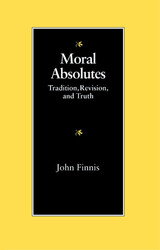
Moral Absolutes
Tradition, Revision, and Truth (Michael J. McGivney Lectures of the John Paul II Institute)
John Finnis
Catholic University of America Press, 1991
Moral Absolutes sets forth a vigorous but careful critique of much recent work in moral theology. It is illustrated with examples from the most controversial aspects of Christian moral doctrine, and a frank account is given of the roots of the upheaval in Roman Catholic moral theology in and after the 1960s.
[more]
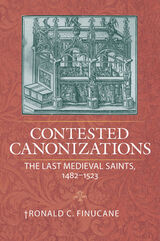
Contested Canonizations
The Last Medieval Saints, 1482-1523
Ronald C. Finucane
Catholic University of America Press, 2011
This work, which forms an important bridge between medieval and Counter-Reformation sanctity and canonization, provides a richly contextualized analysis of the ways in which the last five candidates for sainthood before the Reformation came to be canonized.
[more]
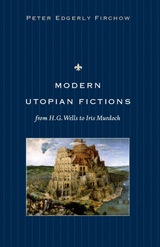
Modern Utopian Fictions from H. G. Wells to Iris Murdoch
Peter Edgerly Firchow
Catholic University of America Press, 2007
This book aims to put the fiction back into utopian fictions. While tracing the development of fiction in the writing of modern utopias, especially in Britain, it seeks to demonstrate in specific ways how those utopias have become increasingly literary--possibly as a reaction not only against the "social scientification" of modern utopias but also in reaction against the modern attempt to institute "utopia" in reality, notably in the former Soviet Union but also in consumerist, late-twentieth-century America.
[more]
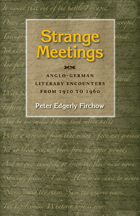
Strange Meetings
Anglo-German Literary Encounters from 1910 to 1960
Peter Edgerly Firchow
Catholic University of America Press, 2008
Building upon his earlier book The Death of the German Cousin (1986), renowned author Peter Edgerly Firchow focuses Strange Meetings on major modern British writers from Eliot to Auden and explores the development of British conceptions and misconceptions of Germany and Germans from 1910 to 1960.
[more]
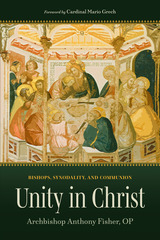
Unity in Christ
Bishops, Synodality, and Communion
Archbishop Anthony Fisher, OP
Catholic University of America Press, 2023
What does episcopal fraternity and communio look like? This central question is explored through the erudition and experience of Archbishop Anthony Fisher, Catholic Archbishop of Sydney, Australia. Unity in Christ, based upon a series of addresses given to the United States Conference of Catholic Bishops (USCCB) at their Special Assembly in 2022, delves into the themes associated with episcopal unity. By surveying the Christian tradition, beginning with the scriptures and then through various periods (Apostolic generation, patristic, scholastic, Vatican II, recent post Vatican II developments such as synodality) a coherent picture of episcopal togetherness is presented. What becomes clear is that unity among Christ’s disciples and their successors is not simply an ideal but rather a constitutive element of their office. They are called to love as Christ loved, expressed above all through genuine friendship with one another. The consequences of this fraternity and communio have implications in areas such as spirituality, preaching and fraternal correction, among others. This second feature, the implications of episcopal fraternity and communio, are explored through Archbishop Fisher’s twenty years of experience as a bishop of the Catholic Church. By providing concrete examples of lived episcopal fraternity and communio, Fisher offers a glimpse into both the challenges and fruits of living out Christ’s call that "they might all be one" (Jn 17:21).
[more]
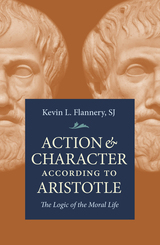
Action and Character According to Aristotle
Kevin L. Flannery, SJ
Catholic University of America Press, 2013
This book will appeal to professional scholars and graduate students with an interest in Aristotles ethics and in ethics generally. It proposes comprehensive interpretations of some difficult passages in Aristotles two major ethical works ( the Nicomachean Ethics and the Eudemian Ethics ). It brings to bear upon the analysis of human behavior passages in Aristotles logical works and in his Physics. It also draws connections among areas of particular interest to contemporary ethics: action theory, the analysis of practical reason, and virtue ethics.
[more]
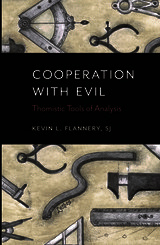
Cooperation with Evil
Thomistic Tools of Analysis
Kevin L. Flannery, SJ
Catholic University of America Press, 2019
Contemporary society very often asks of individuals and/or corporate entities that they perform actions connected in some way with the immoral actions of other individuals or entities. Typically, in the attempt to determine what would be unacceptable cooperation with such immoral actions, Christian scholars and authorities refer to the distinction, which appears in the writings of Alphonsus Liguori, between material and formal cooperation, the latter being connected in some way with the cooperator's intention in so acting. While expressing agreement with most of Alphonsus's determinations in these regards, Cooperation with Evil also argues that the philosophical background to these determinations often lacks coherence, especially when compared to related passages in the writings of Thomas Aquinas.
Having compared the philosophical approaches of these two great moralists, Cooperation with Evil then describes a number of ideas in Thomas's writings that might serve as more effective tools for the analysis of cases of possible immoral cooperation. The book also includes, as appendixes, translations of relevant passages in both Alphonsus and Thomas.
[more]
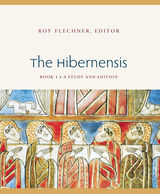
The Hibernensis
Book 1: A Study and Edition
Roy Flechner
Catholic University of America Press, 2019
The Hibernensis is the longest and most comprehensive canon-law text to have circulated in Carolingian Europe. Compiled in Ireland in the late seventh or early eighth century, it exerted a strong and long-lasting influence on the development of European canon law. The present edition offers—for the first time—a complete text of the Hibernensis combining the two main branches of its manuscript transmission. This is accompanied by an English translation and a commentary that is both historical and philological. The Hibernensis is an invaluable source for those interested in church history, the history of canon law, social-economic history, as well as intellectual history, and the history of the book.
Widely recognized as the single most important source for the history of the church in early medieval Ireland, the Hibernensis is also our best index for knowing what books were available in Ireland at the time of its compilation: it consists of excerpted material from the Bible, Church Fathers and doctors, hagiography, church histories, chronicles, wisdom texts, and insular normative material unattested elsewhere. This in addition to the staple sources of canonical collections, comprising the acta of church councils and papal letters. Altogether there are forty-two cited authors and 135 cited texts. But unlike previous canonical collections, the contents of the Hibernensis are not simply derivative: they have been modified and systematically organised, offering an important insight into the manner in which contemporary clerical scholars attempted to define, interpret, and codify law for the use of a growing Christian society.
Widely recognized as the single most important source for the history of the church in early medieval Ireland, the Hibernensis is also our best index for knowing what books were available in Ireland at the time of its compilation: it consists of excerpted material from the Bible, Church Fathers and doctors, hagiography, church histories, chronicles, wisdom texts, and insular normative material unattested elsewhere. This in addition to the staple sources of canonical collections, comprising the acta of church councils and papal letters. Altogether there are forty-two cited authors and 135 cited texts. But unlike previous canonical collections, the contents of the Hibernensis are not simply derivative: they have been modified and systematically organised, offering an important insight into the manner in which contemporary clerical scholars attempted to define, interpret, and codify law for the use of a growing Christian society.
[more]
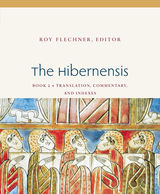
The Hibernensis
Book 2: Translation, Commentary, and Indexes
Roy Flechner
Catholic University of America Press, 2019
The Hibernensis is the longest and most comprehensive canon-law text to have circulated in Carolingian Europe. Compiled in Ireland in the late seventh or early eighth century, it exerted a strong and long-lasting influence on the development of European canon law. The present edition offers—for the first time—a complete text of the Hibernensis combining the two main branches of its manuscript transmission. This is accompanied by an English translation and a commentary that is both historical and philological. The Hibernensis is an invaluable source for those interested in church history, the history of canon law, social-economic history, as well as intellectual history, and the history of the book.
Widely recognized as the single most important source for the history of the church in early medieval Ireland, the Hibernensis is also our best index for knowing what books were available in Ireland at the time of its compilation: it consists of excerpted material from the Bible, Church Fathers and doctors, hagiography, church histories, chronicles, wisdom texts, and insular normative material unattested elsewhere. This in addition to the staple sources of canonical collections, comprising the acta of church councils and papal letters. Altogether there are forty-two cited authors and 135 cited texts. But unlike previous canonical collections, the contents of the Hibernensis are not simply derivative: they have been modified and systematically organised, offering an important insight into the manner in which contemporary clerical scholars attempted to define, interpret, and codify law for the use of a growing Christian society.
Widely recognized as the single most important source for the history of the church in early medieval Ireland, the Hibernensis is also our best index for knowing what books were available in Ireland at the time of its compilation: it consists of excerpted material from the Bible, Church Fathers and doctors, hagiography, church histories, chronicles, wisdom texts, and insular normative material unattested elsewhere. This in addition to the staple sources of canonical collections, comprising the acta of church councils and papal letters. Altogether there are forty-two cited authors and 135 cited texts. But unlike previous canonical collections, the contents of the Hibernensis are not simply derivative: they have been modified and systematically organised, offering an important insight into the manner in which contemporary clerical scholars attempted to define, interpret, and codify law for the use of a growing Christian society.
[more]
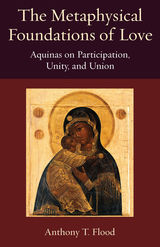
The Metaphysical Foundations of Love
Aquinas on Participation, Unity, and Union
Anthony T. Flood
Catholic University of America Press, 2018
The Metaphysical Foundations of Love: Aquinas on Participation, Unity, and Union offers a systematic treatment of St. Thomas Aquinas’s account of the metaphysical relations of unity-to-union and unity-to-participation in God as the key structuring elements to the nature of love and friendship. In general, Aquinas identifies love as the source and summit of the life of each human being. Everything in the created realm issues forth from God’s creative love, and the ultimate end of all human persons is the greatest possible union with God. Aquinas contends that the love of friendship allows for the greatest union between two persons; thus, the greatest union with God takes the form of friendship with him.
[more]
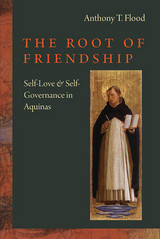
The Root of Friendship
Anthony T. Flood
Catholic University of America Press, 2014
The Root of Friendship addresses the connections between self-love and self-governance in the thought of St. Thomas Aquinas and defends three related theses. First, Aquinas's account of proper self-love is a description of the nature and importance of a person's subjective self- experience. Second, his notion of self-governance cannot be understood fully unless we grasp its basis in self-love. Finally, his account both satisfies contemporary conditions of relevance for self-governance and offers attractive solutions to issues raised in analytic discussions on such matters.
[more]
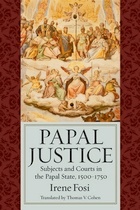
Papal Justice
Subjects and Courts in the Papal State, 1500-1750
Irene Fosi
Catholic University of America Press, 2011
This lively overview of the papal justice system reaches a transatlantic readership and makes available the fruit of Fosi's decades-long research in unpublished archives in Rome and the Vatican.
[more]
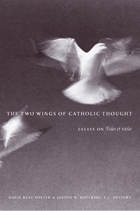
The Two Wings of Catholic Thought
Essays on Fides et Ratio
David Ruel Foster
Catholic University of America Press, 2003
The purpose of this volume is to deepen the appreciation for the stereophonic approach to truth that the Holy Father recommends.
[more]
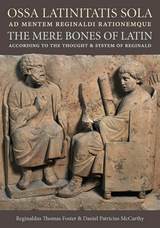
Ossa Latinitatis Sola Ad Mentem Reginaldi Rationemque
Reginaldus Thomas Foster
Catholic University of America Press, 2016
From the first encounter with the Latin language to its full presentation, the objective of Ossa Latinitatis Sola is to get people into immediate contact with and understanding of Latin authors, and for these encounters to grow into a love and use of the entire language in all its literary types and periods of time and authors of the past 2,300 years.
[more]
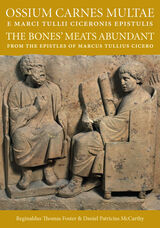
Ossium Carnes Multae e Marci Tullii Ciceronis Epistulis / The Bones’ Meats Abundant from the Epistles of Marcus Tullius Cicero
Reginaldus Thomas Foster
Catholic University of America Press, 2021
Beginners and experts alike will find a complete immersion into the workings and nature of the Latin language embodied in the incomparable, insuperable epistles of the great Marcus Tullius Cicero, something which other commentators pass over or scorn. This second volume puts “meat on the bones” of the Latin language presented in the first volume: Ossa Latinitatis Sola: The Mere Bones of Latin. The personal letters of Cicero provide ample meat to enflesh the skeletal structure of the language, thus the title: Ossium Carnes Multae: The Bones’ Meats Abundant from the epistles of Marcus Tullius Cicero.
Part 1 presents 51 complete letters from the Tyrell-Purser text. Facing each letter is an image of its oldest manuscript edition as early as the ninth century, which are preserved and guarded in the Medicea Laurentiana library in Florence, Italy, witnessing to the human hand preserving this monument of world heritage for over two millennia.
Part 2 follows with a most careful rendition into English of Tully’s living, telephone-like Latin discourse. A thorough treatment and explanation of noteworthy elements of his natural talk follows with numerous references to the Encounters in Volume I. All this has students, learners, teachers, experts of the Latin language in mind and is humbly designed to deepen the understanding and appreciation of specific expressions and peculiarities of Cicero’s language itself.
Part 3 provides 500 sentences consisting of from 1 to 5 words and suited for the beginnings or continuation of Latin conversations: 200 declarations, 100 questions, 100 exclamations, 100 injunctions drawn from his letters. The volume is amply indexed.
All this has been done to enhance the study and use of Latin, to popularize Cicero’s correspondence, to prepare the reader for Volume III which will deal again with the letters and their usefulness for Latin conversation.
[more]
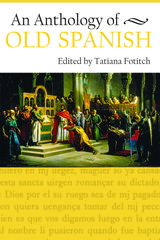
An Anthology of Old Spanish
Tatiana Fotitch
Catholic University of America Press, 2018
In this book, Tatiana Fotitch compiles some of the most fascinating Spanish-language texts from the late-ninth or early tenth century through to the fifteenth century. The selections are specifically aimed to garner the interests of students as they begin the study of Old Spanish, and hence covers a wide variety of different types of material. The anthology includes examples of Mozarabic poetry; the twelfth century Auto de los Reyes Magos and Cantar de Mio Çid; as well as the thirteenth century Roncesvalles, which tells of how Charlemagne, after the battle, mourns his chieftains. Fotitch also includes Gonzalo de Berceo’s Milagros de Nuestra Señora and several works by Alfonso the Wise, including his Libro de las partidas. Fotitch also includes the famous poem El Libro de Buen Amor as well as the playful set of fables known as El Libro de los Gatos.
[more]
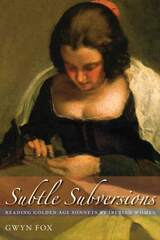
Subtle Subversions
Reading Golden Age Sonnets by Iberian Women
Gwyn Fox
Catholic University of America Press, 2008
Subtle Subversions is the first full-length, contextual, and analytical study of the sonnets of five seventeenth-century women in Spain and Portugal: Luisa de Carvajal y Mendoza, Catalina Clara Ramírez de Guzmán, Sor María de Santa Isabel, Leonor de la Cueva y Silva, and Sor Violante del Cielo
[more]
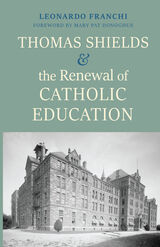
Thomas Shields and the Renewal of Catholic Education
Leonardo Franchi
Catholic University of America Press, 2023
This book explores the contribution of the Rev Dr Thomas Shields (1862-1921) to Catholic education in the United States of America in the late 19th and early 20th century.
Fr Shields was a pioneer in combining a career as an academic in Catholic University of America with the publication of many resources for schools. Given his pioneering role in aligning Catholic educational thought with emerging insights in the sciences, and his multi-layered commitment to Catholic education as scholar, author of textbooks and founder of initiatives in the field of Teacher Education, it seems fitting that his considerable body of work should be the subject of fresh scholarly investigation.
The book is in five parts. Part 1, “Catholicism as an Educational Movement”, sets out the contours of the intellectual climate in which Shields operated and presents Catholicism as a dynamic educational movement. Part 2, “Responding to Progressive Thought”, explores the relationship between Progressivism and Catholic Education, showing how the Catholic Church responded to the challenges presented by Progressive thought. Part 3, “Shields and the Reform of Pedagogy”, examines both Shields’ general pedagogical principles and how they relate to Catholic education. Part 4, “Forming Teachers in Heart and Mind”, considers Shields’ ideas on Catholic Teacher Formation, exploring issues such as culture, vocation, method and curriculum. Part 5, “The Catholic Education Series”, explores selected examples from Shields’ Catholic Education Series to identify how his material for schools reflected, to a greater or lesser extent, his wider educational ideas.
As the present age is also witness to considerable and deep-rooted challenges to Catholic education and, indeed to the Catholic understanding of the human person, Shields’ work will inspire contemporary reform-minded Catholic educators to reassess and develop the mission of Catholic education in light of the traditions of the Church.
[more]

Shared Mission
Religious Education in the Catholic Tradition, Revised Edition
Leonardo Franchi
Catholic University of America Press, 2023
This book is a contribution to scholarship in the field of religious education. Its aim is simple: to offer a critical perspective on the nature of religious education in the light of contemporary developments in Catholic thinking in catechesis and wider thinking in education. The issues raised in the book will provide ample material for fruitful dialogue and constructive debate in the world of Catholic education.
Part One revolves around four historical contexts selected specifically to illuminate contemporary developments in the field. While these historical periods have porous boundaries, they offer a working structure in support of the core claims of the book.
Part Two explores the complex genealogy of the relationship between catechesis and Religious Education. Key thematic frames of reference within which the relevant Magisterial documents and associated academic literature are set out and explored chronologically thus allowing for some cross-referencing across the themes: unsurprisingly the range of the issues for debate resists a neat packaging within specific time-frames but does provide a helpful working structure. Part Three proposes that a Spirituality of Communion should underpin the Church’s work in catechesis, education and Religious Education.
Shared Mission seems to be a satisfactory articulation of the necessary dialogic relationship between both fields and offers a suitable space for both distinction and reciprocity. The revised edition contains an appendix on the Global Compact on Education.
[more]
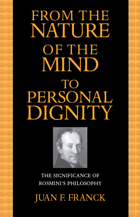
From the Nature of the Mind to Personal Dignity
The Significance of Rosmini's Philosophy
Juan F. Franck
Catholic University of America Press, 2006
This book is the first philosophical study in English devoted to Antonio Rosmini (1797-1855) for over a century.
[more]
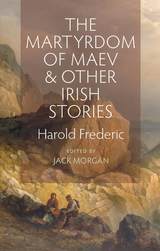
The Martyrdom of Maev and Other Irish Stories
Harold Frederic
Catholic University of America Press, 2015
The Martyrdom of Maev and Other Irish Stories gathers for the first time all of the Irish work Harold Frederic completed in his lifetime. He planned more, but died of a stroke in his early forties, in England, where he was employed as The New York Times London Correspondent. He had earlier written his publisher that he had been "toiling for years" on the archeology of the Iveagha (present Mizen) Peninsula in Cork, and that the projected book of historical fiction underway would be unique. The Martyrdom of Maev and Other Irish Stories brings together the four sixteenth-century stories that Frederic finished and published in magazines in 1895-96, and two of his stories set in the west of Ireland of the second-half of the nineteenth century.
[more]
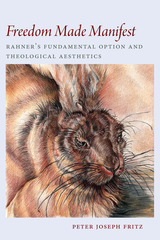
Freedom Made Manifest
Peter Joseph Fritz
Catholic University of America Press, 2019
Freedom Made Manifest explicates Rahner’s theology of freedom by elucidating its configuration and sources. Much of its inquiry centers on the fundamental option: each human person’s eternal decision made, paradoxically, in time, as a definitive answer to God’s personally-tailored call to salvation. This idea stems from three principal sources: Catholic conversations with transcendental-idealist philosophy, penitential theology and practice, and Ignatian spirituality. Rahner’s unique redeployment of these sources inflects the fundamental option with theologies of concupiscence, mercy and forgiveness (especially as ecclesially mediated), and devotion to Jesus Christ. Awareness of these inflections can show how Rahner’s theology of freedom may assist in theological reflection on freedom’s susceptibility to injury and trauma.
[more]
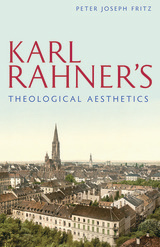
Karl Rahner's Theological Aesthetics
Peter Joseph Fritz
Catholic University of America Press, 2014
This innovative book discloses Karl Rahner's foremost achievement: discovering and delineating an ethos of Catholicism, a multi-faceted and comprehensive approach to life in Christ. Karl Rahner's Theological Aesthetics does so by placing the German Jesuit and his teacher, philosopher Martin Heidegger, into a richly detailed dialogue on aesthetics. The book treats classic Rahner topics such as anthropology and Christology. But it breaks new ground by exploring themes such as angels, Mary, and the apocalypse, juxtaposed with analogous philosophical topics in Heidegger.
[more]
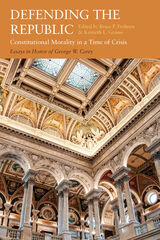
Defending the Republic
Constitutional Monarchy in a Time of Crisis: Essays in Honor of George W. Carey
Bruce Frohnen
Catholic University of America Press, 2022
In recent years, our constitutional order has increasingly come under attack as irredeemably undemocratic, racist, and oppressive. At the same time, it is increasingly obvious that politic practices in the United States have strayed very far from the founders’ designs and become deeply dysfunctional. The time is thus ripe for renewed reflection about the American political tradition.
This volume reintroduces readers to the conservative tradition of political and constitutional discourse. It brings together prominent political scientists and legal scholars, all of whom were deeply influenced by the life and work of the eminent constitutional scholar George W. Carey. For over 40 years, Carey strove mightily to explain the nature and requirements of our political tradition. How it fostered meaningful, virtuous self-government, and how our constitutional tradition has been derailed by progressivist ideology. He is perhaps best known for his concept of “constitutional morality,” the understanding that our republican constitutional order can be sustained only by a combination of formal mechanisms (e.g., separation of powers) and unwritten norms (“standards of behavior”) that act to foster deliberation and consensus, as well as keep political actors within the boundaries of their constitutional offices.
Contributors, including Francis Canavan, Claes G. Ryn, Paul Edward Gottfried, and Peter Augustine Lawler, discuss and develop Carey’s key insights, applying them to issues from the nature of majoritarian government to the purposes of constitutionalism to the decline of virtue that has accompanied the expansion of power among national and international elites. Each essay provides penetrating analysis of key aspects of our tradition, its inherent purposes, growth, and subsequent derailment, as well as the resources remaining within that tradition for the rebuilding of our constitutional order and a decent common life.
[more]
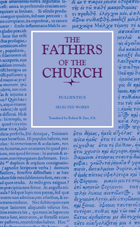
Selected Works
Robert B. Fulgentius
Catholic University of America Press, 1997
This volume gives English readers for the first time an opportunity to study a representative selection of the writings of this early sixth-century author. It also presents Fulgentius's biography, the Life, for the first time in English.
[more]
READERS
Browse our collection.
PUBLISHERS
See BiblioVault's publisher services.
STUDENT SERVICES
Files for college accessibility offices.
UChicago Accessibility Resources
home | accessibility | search | about | contact us
BiblioVault ® 2001 - 2024
The University of Chicago Press









